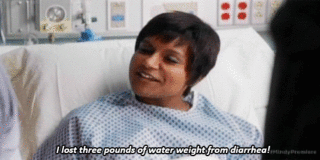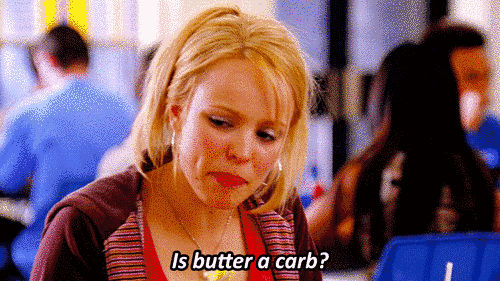Calories in, calories out doesn’t even begin to cover it.
OSTILL / Getty / Thinkstock
“Improving” your metabolism isn’t necessarily as simple as working out more or eating specific foods less.

LOGO / Via soyeahduh.tumblr.com
“There can be a lot of reasons for why metabolism differs from one person to the next,” Dr. Florence Comite, a New York City-based endocrinologist who specializes in precision medicine, tells BuzzFeed Life. “Hormonal indicators, thyroid function, the way the cycle works in women, the way hormones go up and down in men, and how all that interfaces with the way you work out, eat, and sleep.”
You really shouldn’t compare yourself to other people.

Walt Disney Company / Via teendotcom.tumblr.com
“Metabolism is really specific to each person — people don’t recognize that it’s about the individual, and you have to know your own genetic makeup to really understand it,” Comite says. “I like to reference the fact that I’m an identical twin,” she says. “And [my twin and I] put on weight differently, the way we work out affects us differently. And that’s true for every human being.”
There are equations and calculators that can give you a general estimate of how many calories you burn every day, but they’re not super accurate.

Fox / Via io9.com
“In general, for most people, if you do one of these online calculators, you’re probably going to be within 10% of what it says,” Dr. Michael Jensen, endocrinologist, professor of medicine at Mayo Clinic, and body weight regulation and obesity specialist, told BuzzFeed Life . “So if it says 1,600 calories a day, it could be 160 in either direction.”
And that’s for people who fall within a standard and predictable metabolic range. “About 10% of people will have a metabolic rate substantially higher than you would predict, and another 10% of people are going to be quite a bit lower than you predict,” Jensen said. “It might be about 20% less or 20% more.”
Your sleep habits may have just as much of an effect on your metabolism as what you eat and how much you work out.
http://instagram.com/p/2U_Jq6vQir
“If you’re underslept, you may not metabolize sugar in the same way,” Comite says. More and more research is pointing to the idea that not getting enough sleep might be a contributing factor to gaining weight and its associated diseases, for a variety of reasons. In certain sleep studies conducted in laboratories, for example, people who were forced to get too little sleep actually developed some level of insulin resistance — which is a precursor to diabetes. Other research shows that not getting enough sleep makes you crave high-calorie, low nutrient-dense foods more than you normally do, which makes you more likely to overeat foods that aren’t great for you.
Stress can also be a factor!
Chronic stress has been linked to excess belly fat, Comite says. This is a problem because this type of fat (compared to lower-body fat in your butt and hips and thighs) is more heavily associated with diabetes, heart disease, and other bad health stuff. The thinking is that when you’re chronically stressed, you have too much of the stress hormone cortisol hanging around. And that cortisol (as with many other hormones) can really mess with your metabolism.
You may have heard about Basal Metabolic Rate, or BMR. That refers to the energy your body uses just by existing, when you’re doing nothing at all.

20th Century Fox / Via cinemagrapher.com
Technically it’s how many calories your body burns when you’re at rest, after having not eaten for 12 hours, Jensen says. Your body uses energy to keep your organs and other bodily functions running the way they’re supposed to.
For most people, the largest percentage of their daily calorie burn comes from their BMR. Here’s a calculator that can help you figure out your BMR. And here’s a big disclaimer about .
You can figure out the TOTAL number of calories you use each day by looking at your BMR combined with all your activities (like working out, moving around, and so on).

It’s called total energy expenditure (TEE), and here’s a calculator that can help give you an estimate for what it is. (And here is that again.) Your TEE can be a reference point for , depending on your goal — weight maintenance, gain, or loss.
Your BMR tends to go down as you get older.

CBS / Via giphy.com
Every decade your BMR drops a bit more, and it’s not entirely clear why. Life’s not fair.
Muscles really do burn more calories than fat.

Disney / Via gif-database.tumblr.com
As BuzzFeed Life : “The more lean tissue you’ve got, the more calories it takes to keep going, even if you’re just lying in bed doing nothing,” Jensen said. Lean tissue applies to your organs like your liver, heart, and kidneys, and it also refers to your muscles — your muscles use more calories during the day than your fat does. “Fat is the lowest-burning tissue in the body,” Jensen says.
This is why the BMR estimates are different for men and women — in general, men tend to have lower body fat percentage than women do. “If you have a man and a woman who both weigh 70 kilograms, on average the man is going to have less fat and more lean tissue,” Jensen says. “So even at the same weight, men are going to tend to burn more calories when they’re lying around doing nothing. They don’t have as much body fat.”
Eating protein will help you build muscles; eating fewer carbs will help you burn fat more quickly.

Paramount Pictures / Via thisisdieting.tumblr.com
To simplify something super complicated into a few short sentences: Your body needs protein to help your muscles grow. And when you eat a lot of carbs, your body will turn to that as a source of fuel before it turns to energy from your fat. So if your goal is fat loss, you should know that eating foods with less carbohydrates will help you achieve that goal more quickly. And if your goal is to grow and strengthen your muscles, you should make sure you’re getting enough protein.
And eating a well balanced and nutritious diet will be good for your metabolism (and general health) in other ways, too.

Yael Malka / BuzzFeed / Via
There’s some evidence that when you eat a lot of processed foods and simple carbohydrates (think: most of the food in life that is white), you might increase the inflammation in your body. And that inflammation may have a negative effect on your metabolism, Comite says. So do what you can to eat a balanced diet that has lots of veggies and fruits, as well as a good mix of protein, fiber, fats, and complex carbs. The higher quality the fuel you eat, the better your body should run.
Working out is super important for your metabolism (and also your general health). And interval training and resistance training are the best.

Lauren Zaser / BuzzFeed / Via
“Interval training and weight training are how you signal to your body to build more muscle,” Tim Coyle, exercise physiologist at ComiteMD, tells BuzzFeed Life. And more muscle = a better metabolism. 25 minutes of high-intensity interval training is a better strategy than 45 minutes going the same moderate pace on the treadmill, by the way.
Coyle explains it this way: “In order to boost your metabolism, you want to become more inefficient, or wasteful, in terms of energy. Think of a car in New York City compared to a car on the highway. City fuel mileage is always lower than highway miles-per-gallon for a given vehicle. This is because of acceleration (intensity). Slamming on the accelerator at every green light and on the brakes at every red light (as in high-intensity interval training) is a huge waste of gas (read: energy), whereas cruising at 60 mph and ~2000 rpm is about as efficient as it gets for a car (think longer, slower exercise). If you want to boost your metabolism, and lose weight, the best way to do it is to ‘waste as much fuel’ as possible.”
Here are that you can try out.
Fun tip: If you drink coffee before a workout, that can help you burn more fat.

The caffeine in coffee will free up your fat cells for your body to use as an energy source, Coyle says. And it’ll also give you a jolt, which means that you might actually be able to work out harder than you normally would.
And eating protein within half an hour after working out will help you build more muscles.

ABC / Via gifbay.com
“When you work out, you break down muscle tissue and your body absolutely depends on protein in order to build that muscle back up,” Albert Matheny, R.D., C.S.C.S., co-founder of Soho Strength Lab and advisor at Naked Nutrition, told BuzzFeed Life . He recommends getting in a good source of protein within 30 minutes of working out. A Greek yogurt would be a good option.
Instead of obsessing over random specific foods or supplements that supposedly MIGHT increase your metabolism, you’d get more payoff by just… walking more.

Via gifbay.com
“I think the thing that people don’t understand about metabolism is that just really simple stuff like walking is a much better way to burn calories than trying to take foods or supplements or things to manipulate your metabolic rate,” Jensen says. “In terms of bang for your buck, as opposed to wasting a lot of time trying to manipulate your food […] if you just walk an hour a day you’ll get a way bigger effect. I think that’s what people don’t appreciate about metabolism. That movement, just moving that weight of your body around, can burn a fair amount of calories.”
You can learn a bit more about your own metabolism by tracking how much you eat, what kind of activities you do, and your weight.
“The best way for someone to get a better understanding of their metabolism and caloric needs is to keep track of things: what you’re eating, what you’re doing (physical activity), and your weight,” New York City-based dietitian Brittany Kohn, MS, RD, previously told BuzzFeed Life . “Seeing what direction your weight is moving (or not) as a result of what you’re eating and what physical activity you’re doing will help determine what changes to make in order to see your desired results.”
But if things still aren’t making sense, you should talk to your doctor about what else might be going on.

ABC / Via reddit.com
Comite stresses that your metabolism and your ability to lose, gain, or maintain your weight may be a LOT more complicated than just keeping track of calories in, calories out and getting your fitness in. Family history plays a role, your thyroid may be a factor, your hormones could influence you, and more. Comite suggests talking to your doctor about all this stuff to see if they can help you pinpoint what’s going on — and what you might want to do about it. And in the meantime: Do what you can not to compare yourself to others. Everyone is different and coming from a different place.
18.
buzzfeed.com
18.
buzzfeed.com
18.
buzzfeed.com
18.
buzzfeed.com

















